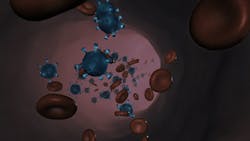Hardy Diagnostics has announced FDA EUA approval for a new in vitro diagnostic medical device: Anti-SARS-CoV-2 Rapid Test (Cat. No. RTA0203).
This immunoassay is intended for qualitative detection and differentiation of IgM and IgG antibodies to SARS-CoV-2 in human plasma or serum. This test was developed by Autobio Diagnostics, based in Zhengzhou, China. Through this partnership, Hardy Diagnostics and Autobio have begun to open supply chains to exclusively deliver this rapid test to the United States. This rapid market deployment of a new in vitro diagnostic medical device was made possible through the FDA Emergency Use Authorization (EUA) program. This program is used in times of crisis, such as the current COVID-19 pandemic.
IgM antibodies are generated initially by the body as a result of infection at about the time symptoms appear. IgM antibodies will dissipate within approximately one month. IgG antibodies are generated by the body about one week after symptoms appear and last for an extended amount of time.
By using a patient’s serum or plasma specimen, the Anti-SARS-CoV-2 Rapid Test offers a turnaround time of only 15 minutes. This simple-to-use test requires no equipment or special expertise or training to implement.
The Anti-SARS-CoV-2 Rapid Test is a lateral flow immunoassay intended for the qualitative detection and differentiation of IgM and IgG antibodies to SARS-CoV-2 in human plasma from anticoagulated blood (Heparin/ EDTA/ sodium citrate) or serum from individuals with signs and symptoms of infection who are suspected of COVID-19 infection. The Anti-SARS-CoV-2 Rapid Test is also intended for use as an aid in identifying individuals with an adaptive immune response to SARS-CoV-2, indicating recent or prior infection.
Testing is limited to laboratories certified under the Clinical Laboratory Improvement Amendments of 1988 (CLIA), 42 U.S.C 263a, to perform moderate or high complexity tests. The Anti-SARS-CoV-2 Rapid Test is intended for use by clinical laboratory personnel specifically instructed and trained in the techniques of in vitro diagnostic procedures.
Negative results do not rule out SARS-CoV-2 infection, particularly in those who have been in recent contact with the virus, due to the lag time between exposure and the patient’s antibody response.
This test should not be used as the sole basis for patient management decisions. Test results must be combined with clinical observations, patient history, and epidemiological information.
Follow-up testing with a molecular diagnostic test should be considered to confirm the infection status. This test is not intended for the screening of donated blood.
This test will be useful in identifying asymptomatic and mildly symptomatic carriers of the SARS-CoV-2 virus. It will also be helpful in identifying persons who were infected by the virus previously but may not have been properly diagnosed.
Studies suggest that antibody testing for COVID-19 may provide useful information in managing the infected patient, making determinations as to immune status, and preventing the future spreading of the disease.

